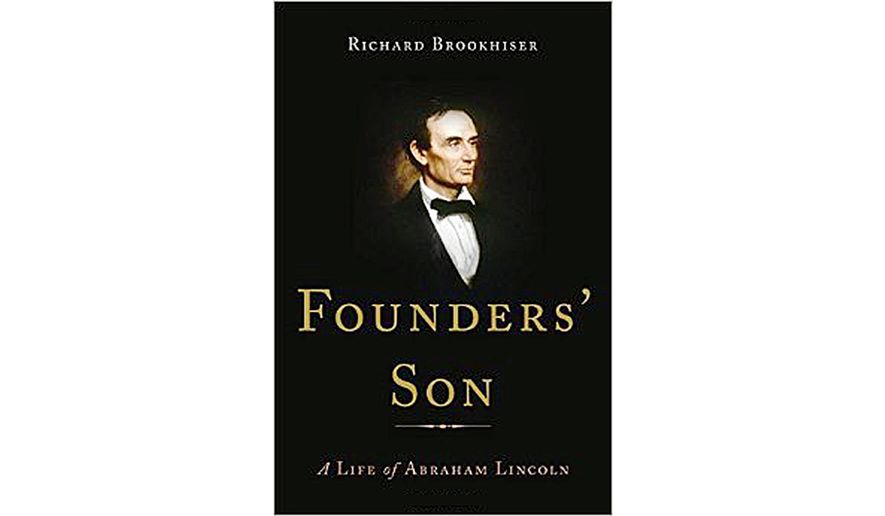OPINION:
FOUNDERS’ SON: A LIFE OF ABRAHAM LINCOLN
By Richard Brookhiser
Basic Books, $27.99, 347 pages
Most presidents are defined by what happened while they were in office and what others write about them afterward. Few paint enduring self-portraits in their own words. In the 20th century, only Franklin Roosevelt and Ronald Reagan embedded themselves in history largely through their living words and images — FDR via radio and film, Reagan using television as well. In both cases, the words and images they used have defined them to succeeding generations. Part of the reason is the immense, mainly positive impact of their words. FDR told us we had nothing to fear but fear itself, and we overcame the Great Depression and liberated the world from the real Axis of Evil. Ronald Reagan told Mr. Gorbachev to tear down that wall and down it came, along with the evil empire hiding behind it. Great rhetoric matched by great achievements is remembered. Otherwise, it’s just words.
Only one 19th century American president attained the same level of success as both rhetorician and leader — and he did so without the vast majority of his fellow countrymen ever seeing his living presence or hearing the sound of his voice. Abraham Lincoln was truly a man of his words, which is why they live today and still have meaning for us, both in trying to understand the American past and in seeking the right course for America’s future.
One reason Lincoln’s words resound — and they really were his words, without benefit of ghostwriters — is that, as a self-educated man, he drew on language which, however eloquent, was always accessible to the average citizen. Fortunately for him, one of the few books that could be found in almost every American home in those days was the King James Bible. If the Gettysburg Address had started with the words “eighty-seven years ago” instead of “four score and seven years ago” would we remember it quite so vividly today? And would it have given its contemporary audience the same sense of solemn, near-biblical purpose? One of history’s greatest — and, perhaps not coincidentally — briefest orations, it is as much a prayer as it is a speech.
Lincoln immediately linked his biblical opening to “our forefathers,” specifically the Founding Fathers who had signed the Declaration of Independence, another document familiar to nearly every literate American of Lincoln’s time. Having tied Divine Providence to the Founders, he proceeded to link their vision to the bloody struggle of the moment (“now we are engaged in a great civil war”) relating that struggle, in turn, to the preservation of the Founders’ vision. The tragic slaughter, the incredible suffering and destruction, were validated because the Founders’ declaration that “all men are created equal” would not only survive, but that, “this nation, under God, shall have a new birth of freedom” and “government of the people, by the people, for the people, shall not perish from the earth.”
Successive generations of historians, biographers and political scientists have tried to reinvent Lincoln as a point of departure, as some sort of social revolutionary, breaker away from past values and founding principles, or cracker-barrel, cornball populist who blundered into a horrendous civil war. Again and again, Lincoln’s own words tell us otherwise. Now Richard Brookhiser, a gifted popular historian best known for his works on Washington, Madison, Hamilton and other Founding Fathers, has written a book that seeks to re-attach the Founders to Lincoln and, through Lincoln, to succeeding generations of Americans up to the present. While there are moments when his parsing and textual analysis can verge on the tedious or get a bit labored, on the whole he succeeds admirably.
“Founders’ Son” is not just another Lincoln biography (more than 15,000 have already been published). Instead, it is a chronicle of Lincoln’s mental and spiritual evolution, much of it written in his own words; indeed, Abraham Lincoln has almost all the best lines. One of the most curious insights one takes away from this thoroughly researched and engagingly-written work is an ironic one. The Founding Father that Lincoln had the most in common with was the one he knew the least about: Alexander Hamilton. Both were born poor and underprivileged, both resolved to better themselves through applied intelligence, both opposed slavery, and both had an expansive vision of an indissoluble American union growing in power, prosperity and opportunity. In the case of Lincoln, amid all the distractions of the Civil War, that vision included the Homestead Act and the establishment of our system of land grant colleges and universities. Both helped to preserve and extend democratic ideals at least as much as the Civil War — and at considerably less cost.
• Aram Bakshian Jr. was director of presidential speechwriting for Ronald Reagan (1981-83) and has written widely on politics, history, gastronomy and the arts.




Please read our comment policy before commenting.